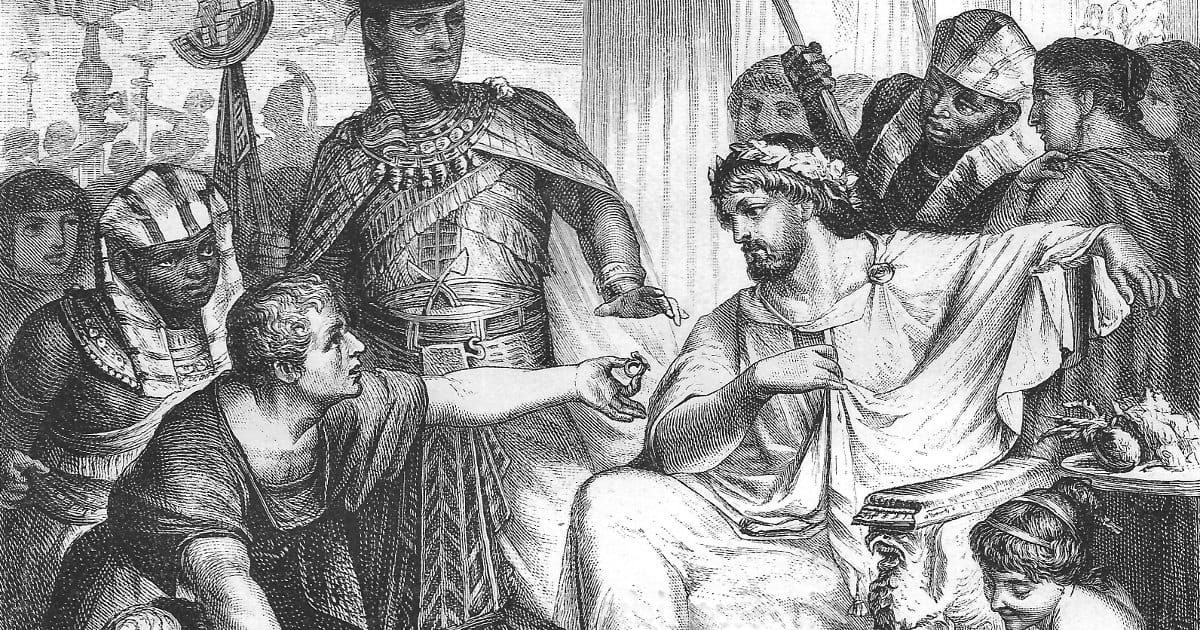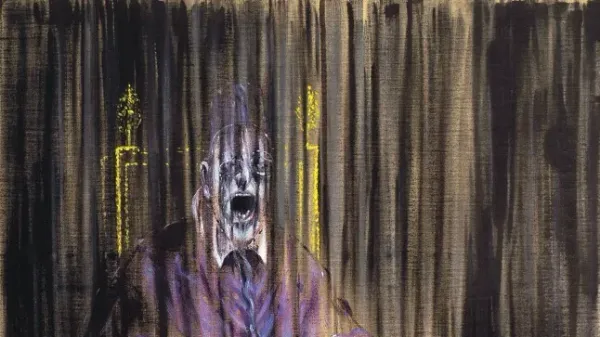Four Stories About A King

There was once a king who was blessed in every way. He was kind to his friends and merciful to his enemies. He was severe in matters of state and jovial in matters of spirit. He was possessed of great wisdom, and yet did not think himself so wise that he would not listen to the counsel of others. He had inured himself against the follies of greed, callousness, and outsized ambition, and he sought to safeguard and guide his people rather than tyrannize them.
His realm was rich and prosperous. Even the most meager peasant could be assured of steady meals and walls to shelter behind in case of wolves or bandits. His ministers and judges were renowned for their incorruptibility and impartiality, and those rare exceptions who exploited their position for personal gain were swiftly tried and exiled. The king had reigned now for many summers, and in the realm it had become that only the eldest remembered the sting of war or hunger.
The king, now facing the dawn of his old age, had begun to wonder about his life. Seeking counsel, he quit the kingdom to seek out a friend he had known in his childhood, who had become a sage known for his insight into the nature of the gods. Leaving his lands in the hands of a capable regent, he wandered for seven days and seven nights before finding the home of the sage, who lived amongst the abandoned ruins of a great city.
The sage, recognizing his childhood companion, welcomed the king, and the two of them broke bread together. Though the food was meager, both were happy in reunion. After the food had been finished the sage brought out a jar of wine, and when the jar had grown light the two set to talking.
“I am lucky,” said the king. “I want for nothing. My realm is healthy and prosperous and secure from within and without. My jailers and generals grow bored from lack of work. Death arrives for my people only as old age. My body is still strong and vital, my family is healthy: I love, and am loved in turn.”
“If what you say is true, King, then you are in grave danger,” said the sage. “The gods love nothing more than to raise a man high just to cast him down again. When you were a child, perhaps you amused yourself by dropping stones into a lake, and amused yourself all the greater the higher the perch from which you let the stone fall: in this way are the gods in the lives of men. Surely they have set aside some awful fate for you.”
“How might this fate be avoided?” asked the king.
The sage thought for a moment, calling up the ancestral wisdom in the shadowed passageways of his mind. Then he said:
“What is the thing you treasure most in the world?”
“Why, that’s easy,” said the king. “It’s this emerald ring, given to me by my father upon my ascension to the throne. It is all I have of him, and the symbol of my office: it is very dear to me.”
“Then you must cast it away,” said the sage. “Get rid of it, and perhaps the gods will decide you have lost enough to be spared.”
Heeding the sage’s words, as the king crossed a narrow causeway on the path back to his kingdom, he took the ring from his finger and threw it into the ocean, which greedily swallowed it up.
The people of the kingdom overjoyed to see the return of their king, and soon a competition emerged to see whom among them could present him with the most lavish gift upon his returning. From a breeder of horses he received two mares the color of moonlight. From a blacksmith he received a breastplate strong enough to turn aside any blade. From a tailor he received a cloak embroidered with all the colors of the rainbow, and more hitherto unseen.
As the competition drew to a close, a fisherman approached the king, holding up a large fish.
“My king,” said the fisherman, “my catch has been poor this year, so I only have this fish to offer. Please, accept my meager gift.”
“That you would offer unto others even amidst your own poverty does me a great honor,” replied the king. “I will savor your gracious gift.”
The king’s chef prepared the fish, but as she slid the knife through its guts the king’s ring fell out of his stomach. The chef ran from the kitchen in jubilation, eager to show her countrymen how their ruler had been favored by the gods. But at the sight of the ring, the king began to weep, because he knew the gods had turned away his sacrifice.
Three summers hence the emperor of the barbarians came to the king’s realm and made it a desolation. The king himself was strung up upon one of their war-banners, and breathed his last watching his city burn.
There once was a king whose sacrifice had been rejected. Outwardly, he lived with the utmost grace and benevolence, treating all those who came to seek his counsel as if they were members of his own family. His mind, however, was clouded by terror. He could not sleep without his dreams summoning up the most grotesque images of the fates the gods must surely have set aside for him. He lived in the manner of a condemned prisoner: food had no taste for him, rest no succor.
His daughter, scarcely out of girlhood but already possessed of an ancient’s wisdom, was alone able to detect the change that had overtaken her father. By means subtle and direct she implored him to tell her what troubled him so, for she knew that a burden shared was a burden lessened. But the king, not wanting to inflict the same fear upon his daughter as the gods had inflicted upon him, said nothing.
When his scouts reported the movement of the armies of the emperor of the barbarians on the kingdom’s western fringe, the king found himself strangely relieved. Even as his generals returned bloodied and defeated from the field of battle one by one, the king remained filled with an inner calm. He had lived so long in the shadow of the gods: now, at least, they had revealed their horrific face.
Soon the barbarian horde came to lay siege to the city of the king. The people began to starve. At this the unearthly sanguinity that had overtook him finally fell away. The king could accept the certainty of his own death, but he could not idly overlook the slaughter of his own people.
One night, while the city slept uneasily and dreamed famine-dreams, the king stood upon his palace balcony and begged the gods to spare his city from destruction.
“Have I not offered you my most prized possession?” he said. “Have I not humbled myself before you, who are masters of all things? What more could I offer?”
And in saying so, a gust of wind blew a curtain aside, and for the briefest of instants a shaft of moonlight fell upon the form of the king’s sleeping daughter.
In the morning, a plague began to sweep through the massed army beyond the city walls. Within a week, so many men had sickened or died that the soldiery maintaining the siege had withered to half strength: within two, the army itself had dissolved and blown away alike to dust on the wind.
The king lived for a very long time, in a palace which seemed to him to grow emptier with each passing day. He died sitting upon his throne, staring out towards the mountains beyond the boundaries of his realm. Clutched in his palm was an emerald ring, and even in death the king’s grip was so tight that three servants working together could not remove it.
There once was a king whose armies were victorious in a great battle. His generals, no less cunning for their long years of inaction, had skillfully maneuvered their troops to crush the armies of the barbarian emperor on the field and send them into a rout. Each new day brought reports of glorious victory, as his armies pressed their advantage and struck deeper into barbarian country to neutralize their perennial foe.
Each success brought the king greater and greater despair. Each new triumph now seemed to him another step deeper into the underworld, where torments beyond imagining awaited him. When he imagined the horrific punishments the barbarians were supposed to inflict upon their enemies– removing a man’s organs while he still lived, or having him torn apart by trained oxen– his terror was all the greater, for he knew that the gods would only spare him these punishments if their divine imaginings had conceived of something yet fouler still.
The armies returned adorned with glory, and the king held triumphs and bestowed upon the victorious generals the most sacred honors of the realm. In solitude, he wailed and gnashed his teeth, lashing out at the gods for the cruelty in granting him this utmost fortune.
“I beg you,” he said. “Lay me low with illness. Let my eyes go blind and my teeth fall from my head. Let me succumb to madness, or become utterly insensate to the world. I have done you no wrong: why, then, do you insist on punishing me with luck beyond my capacity to repay?”
But the gods gave no reply.
Before long the horror the king felt must surely wait in store for him grew in magnitude vaster than words could encompass. To fall into the palm of the gods would be to submit himself to humiliation and undoing so total it would defile his name for centuries to follow. The only way to escape the callous plans of the gods was to take his fate into his own hands. One morning, upon hearing news of an exceptionally bountiful harvest, the king stepped onto his palace balcony and threw himself over the edge.
Upon striking the ground he landed upon a messenger, killing both of them instantly. The messenger had arrived at the palace to inform the king that his daughter had just successfully given birth to a healthy baby boy. The plans of the gods were affected not at all.
There once was a king who raged at the gods.
To the sage he said: “I have honored them in their feast-days and festivals. I have made sacrifices unto them, and conducted the affairs of my state and person in accordance with their every dictate. Though I am blessed by my fortune, I have striven to live my life with the utmost piety towards those forces superior to all things. Why, then, shall I be punished? If the gods have decided that I have been rewarded beyond what I deserve, then it is their misdoing, and yet I am to be the one who shall suffer for it. Am I to accept this arbitrary cruelty, merely because it is meted out by those more powerful than myself? Am I to live as the man who accepts the rule of a tyrant for fear of his own safety?”
“I know not their reasons,” said the sage, “only their ways.”
“Then I shall demand to know their reasons myself,” said the king. “I will ascend the mountains that lie beyond the borders of my kingdom, where the gods are said to dwell when they retire from their meddling in the affairs of men. I will demand of them a justification, and though I am certain I will be punished severely, such punishment cannot be greater than that for which the gods have elected me by my tremendous fortune. Will you, sage, stop me from this endeavour?”
“You are aimed towards your own unmaking,” said the sage. “But I see your heart, and I know that you are beyond the grip of words. Go, then, and see what awaits you.”
The king returned to his palace, and made preparations to ascend the mountain. He told no one of his intentions, but before leaving issued a dictate naming his daughter as his heir, so that she would ascend to the throne upon reaching the age of wisdom. On a night between moons, he dressed himself in the exomis of a peasant, and quit the city upon a sturdy mule.
The king began to climb. His body, having been softened by long years of lordship, was quite unfit for the task at first. Many times he fell, bruising himself on the slopes and nearly losing his life. Exertion caused him to work through the small supply of rations he had brought with him, and soon he was reduced to foraging for berries and hunting the small rabbits that clustered amidst the mountain’s timeworn features.
Many years passed as he climbed. His body became hardened and pockmarked with scars, the sun dying it the same ruddy color as a soldier’s boot. His beard grew long and wild for lack of shaving, so it was that any who saw him would have named him a madman or a hermit rather than a king. His body grew lean, his muscles strong. From stone he learned the secrets of resilience; from wind he learned the secrets of flux. Though he went days without food or water, and the heat boiled the thoughts from his skull, he did not depart from his task.
Finally he reached the summit. Stopping for a brief moment to rest, and slake his thirst with the snow that crusted over the top of a boulder, the king found himself suddenly standing at the lip of an immense caldera. Below him, he saw the splendor of the City of the Gods, and the Great Hall of the Gods which stood at its center.
After a day of carefully descending the slope, he came to the doorway of the Great Hall of the Gods, ten times the height of a man.
“Long have I lived to please you,” said the king. “Long have I labored in your glory. But you turn your face from me, and reward your faithful only with pain. I damn myself to walk amongst your works: so be it. You have damned me already with my surfeit of fortune. If I am to be unmade, I will have an answer before the underworld takes me.”
So saying, he put his weight against the doors. Inch by inch, the doors swung wide, and the king stepped forward into the Great Hall.
The hall was empty; the thrones vacant. Dust settled upon the stones, as if the gods had been absent for a very long time.


